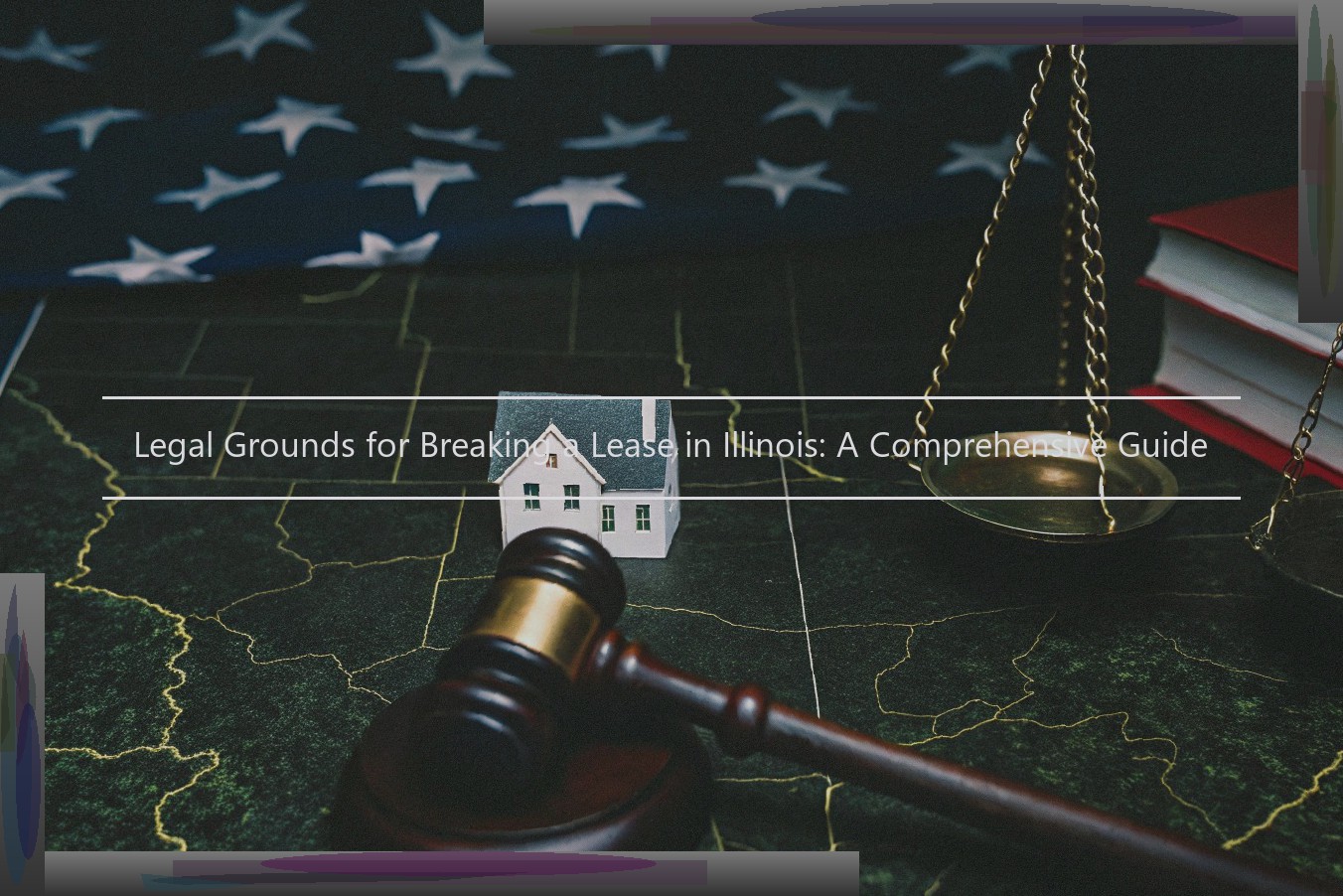Legal Grounds for Breaking a Lease in Illinois: A Comprehensive Guide
Lease Termination in Illinois: An Introduction
From a legal perspective, lease agreements in Illinois traditionally exist when a tenant, in exchange for rent, gets an exclusive right to use and occupy a space owned by the landlord for a specified period of time. In many ways, a lease gives both the tenant and the landlord a sense of security: tenants have peace of mind that they’ll be able to live in their homes for the next year or so, and landlords can count on receiving rent for the full term of the lease. Generally, this can be beneficial to both parties; however, there are situations that can arise that make this arrangement less than ideal.
Normal property management situations — such as finding a new tenant when a property becomes vacant or evicting a tenant for nonpayment of rent — all have clear solutions in Illinois law. But what happens when a normal situation becomes abnormal? If a tenant has to leave before the expiration of a lease, how should that be done? And how should it be handled if it’s a landlord who is at fault?
In Illinois , a tenant may be able to break a lease if he or she experiences legal reasons that outweigh the legal obligation to continue paying rent. These legal reasons include (but are not limited to):
In addition to understanding the legal reasons for breaking a lease, both tenants and landlords should also consider legally-worded provisions frequently included in lease agreements in Illinois. Common names for these provisions include lease-break clauses, early termination clauses, buy-out provisions and sublease/sublet clauses. While all of these are unique to each lease agreement, they all serve the same general purpose: to give guidance to tenants and landlords for the process of ending a lease early. If legal reasons for breaking a lease do not apply, these provisions will dictate how much a tenant must pay to break a lease or what processes they must go through to leave the property before the end of the term.

Active Duty Military Exception
The Servicemembers Civil Relief Act (SCRA) provides further protections to active duty military personnel who wish to break a lease early. An individual is considered to be on active duty if he or she is in the U.S. Armed Forces or, as one legal blog puts it, "if you are in any status as a member of any component of the uniformed services, including full-time service in the National Guard or service by a commissioned officer of the Public Health Service or the National Oceanic and Atmospheric Administration."
If you qualify as an active duty service member and a landlord owns a residential rental property in Illinois which is leased to you, you may terminate the lease early without penalty provided the following conditions are met:
- The lease was signed while you were active duty;
- You receive qualifying reassignment orders;
- The presence of your spouse and/or dependents in the state would now result in undue hardship; and
- You provide the proper notification and paperwork.
What happens if you are ineligible for the protections outlined above as an active duty military leaseholder? Regardless of whether you are in the military, the SCRA provides protections for all individuals when it comes to complex, fast-paced relocations and reservists and permanent change of station orders, changes in job status, marriage, divorce or other life events that may shorten housing commitments.
Living in Uninhabitable Conditions
Under Illinois law, a tenant is permitted to break a lease prior to its intended expiration if the premises are rendered uninhabitable. Under the law a residential dwelling can be considered uninhabitable when there is a defect that materially affects the physical health or safety of an ordinary tenant. A defect significantly increasing the burdens or burdens of a tenant is not considered a material defect.
It should be noted that the threshold for determining whether a premises is uninhabitable is a high one for a tenant to meet. Depending on the severity of the defect, a tenant may have an obligation to continue performance under the lease. For example, a landlord may be required to make a necessary repair to fix a minor issue, but a small crack in a window may not rise to the level of uninhabitability. However, the loss of running water to a unit would likely be considered material. Furthermore, where the conditions have become unreasonably dangerous, as with gas leaks, electrical shorts or other hazards posing improper exposure to fire may also rise to the level of uninhabitability.
In Illinois, landlords have a responsibility to their tenants that are not unlike that of a lessor to a lessee under a commercial lease. If a landlord fails to repair a defective condition, the tenant must give the landlord notice and a reasonable period of time to repair the condition. If the landlord does not repair the condition within a reasonable amount of time, the tenant may break the lease without liability or continue to live there without paying the rent.
Victims of Domestic Abuse
In Illinois, both State and Federal laws provide extra protections for victims of domestic violence and their families in order to prevent further victimization. So if you believe that breaking your lease is the best option for you, perhaps because of domestic violence, you should be aware that as long as you meet the legal requirements, you may be able to do so without any financial liability for breach of the lease. You may also be entitled to additional protection under the Chapter 100 provisions of the Illinois Code of Civil Procedure if the landlord tries to sue you for breaking your lease.
The federal Violence Against Women Act ("VAWA") gives additional rights to victims of domestic violence (which may include spouses, roommates or children of the primary leaseholder). Under that law, a tenant may terminate her lease if she or her minor child is a victim of domestic violence. For the tenant to avoid liability for breaking the lease, all she must do is to give the landlord appropriate written notice and documentation. To break your lease after you are a victim of domestic violence, you must have the following:
Provided that the tenant meets these requirements, the tenant’s family member shall have the right to terminate any rental agreement in accordance with Article 121 of the Illinois Code of Civil Procedure.
Landlords Violating the Right to Privacy
In Illinois, tenants are afforded the right to privacy in their leased premises. The law imposes that the tenant deserves a space in which to enjoy and secure the use of without the unwarranted entry of third parties. This is, of course, premised upon the need for some access to the property by the landlord or his or her agent. A condo association or apartment building may have an on-site maintenance or other staff person who needs access to the unit. An owner of the building may also have the right to access the unit in order to make repairs. All of these are enforceable as long as there is no lease provision to the contrary. In fact, most leases you will see will require that a tenant provide reasonable access to the landlord or his or her agent, typically tied to advanced notice.
A violation of the tenant’s right to privacy can include a situation where the tenant is given little to no notice of entry by a landlord or a change in the locks and then the landlord allows anyone to access their unit. These are occurrences that often arise in the context of a lease termination where the tenant’s presence in the unit is contested due to non-payment or another lease violation. When the tenant is gone, the landlord will then re-key and enter the unit on very short notice.
This is not OK. In such cases, you have a violation of the tenant’s right to privacy and may also have a criminal charge of trespass if there was an even greater violation of the space. You also have a right to breach the lease as a tenant, terminate the lease and obtain damages if needed. The law can be found at 68 ILCS 1108.5 which provides the following:
"(a) A tenant shall not unreasonably refuse an owner or agent reasonable access to the unit, except that except as provided by statute, a lease shall not permit entry into the property: (1) in a manner that interferes with the tenant’s right to privacy; (2) except between the hours of 9 AM and 5:30 PM; (3) on legal holidays; (4) on a weekend; or (5) except in an emergency. So long as a property is vacated under the laws of this State, a pay or quit notice or any notice to vacate may be posted at the property by a person authorized by an owner or agent of the property, upon the tenant, tenant’s agent, or occupant of the property."
That said, a landlord does reserve the right to access the property if there is an emergency situation that calls for their entry. But even in these situations, it is best practice for a landlord to provide as much notice as is feasible. To be clear, an emergency is not when you just realize the tenant left without paying rent and you cannot get access to the unit to show it. Nor is it an emergency if you are allowed into the unit, can see that it is vacant and properly turn the locks on your own.
If you are a tenant that has a lease that contains language that states that you must allow for access for any reason, such language will likely violate the law if challenged in court or otherwise. It is best to get the lease language right up front so that this does not become a problem. But it will happen sometimes, as nothing in the law can prevent a situation such as described above. If you been put in this situation, you should know that you can take the property out of the hands of this landlord. There are serious ramifications for them if you do.
Dishonesty by the Landlord
There are also circumstances that may arise when a landlord has breached his or her part of the lease agreement and thus, the tenant may be allowed to break the lease without penalty. If the tenant is to forfeit his security deposit, it may be helpful to get legal advice to ensure the amount is appropriate.
If the landlord fails to make agreed-upon repairs in the lease and the tenant notifies the landlord within a reasonable amount of time but the landlord still does not comply with leasing terms, the tenant may have the legal right to break the lease as the landlord has materially breached it . For example, if a landlord fails to provide running water where it has been agreed upon in the lease, pays for each of the tenants utilities but in fact does not (even if the tenant reasonably agreed to do so) and there is a material breach such as broken stairs or a leaky roof. In all of these instances, there is a material breach and the tenant has the legal right to break the lease and even sue for damages that are provable. Finally, it is important to note that Illinois law does not allow a tenant to "just break a lease" because he or she has to move for personal reasons. It must be clearly shown that there is an appropriate basis to break the lease, or the tenant risks incurring significant penalties.
The Process of Legally Terminating a Lease
To avoid or minimize the risk of litigation when breaking a lease in Illinois for legal reasons, Illinois law requires that tenants provide at least 60 days prior written notice to the landlord. Such notice must be in writing and signed by all adult tenants on the lease. The notice can be provided either in person (or by an agent), by mail, or by hand delivery, but always in writing. For example, if you were planning to move out on October 1st, the notice would need to be delivered on or before August 1st. If you contract with a moving company, you should not wait until the last minute to give notice to your landlord.
Some of the other requirements to break a lease legally vary based on the reason for breaking the lease, as discussed above. However, in most cases, a tenant should provide proof that they have moved out. In many cases, you may be responsible for paying rent until the next tenant moves in or the lease expires. To avoid paying rent while waiting for a new tenant (or if the landlord refuses to show the unit to prospective tenants), you need to complete all responsibilities in your lease and make the tenant available for showing. Of course, once the landlord finds a qualified tenant, your rights and responsibilities under the lease are terminated, and the new tenant is now responsible for rent and for the conditions of the lease.
Consequences and Liabilities
While there are legal provisions that allow a tenant to break a lease without liability, there may be significant financial and legal consequences for tenants who break a lease for non-legal reasons. The biggest one may be that you remain financially liable to pay rent to your current landlord through the end of your lease term, or until the unit is re-rented, whichever comes first.
In Illinois, landlords are required to make reasonable efforts to mitigate damages by attempting to re-rent your apartment. This generally means that while the landlord does not have to immediately rent out the unit, when the landlord does find a new tenant, the original tenant’s liability for the rent will end at that point. In other words, you may have to pay for the rent for the balance of your lease before the landlord finds a new tenant, but you will not have to pay the full term.
A landlord is not required to rent out your apartment, even in high-demand areas like the One Riverside Apartments in Chicago. For example, if your apartment is located in a neighborhood where the current rental trend is increasing prices, it may take a while for your landlord to find a new tenant willing to pay a rent that is less than market value.
However, if you do break your lease and if your landlord rents out your apartment quickly, you could still be liable to your landlord for the rent until the end of your lease term. Not only that, but you could also be liable for the difference in rent if the new tenant is paying less than you were.
For example, if you currently pay $2,000 a month in rent for a two-bedroom unit, and it is taking your landlord 30 days to find a sublessor (as required under Chicago law), then during that time, you will be required to pay your landlord $4,000. Then, when your landlord finds a sublessor, if you were only able to get $1,900 in rent from your sublessor, you would have to pay your landlord the $100 difference for those 30 days.
There may be other legal obligations to your landlord from breaking the lease. For example, tenants who try to sublet an apartment without notifying their landlord and obtaining permission in advance can technically be held liable for eviction—although this is very rarely enforced—but if your landlord plans to evict you for having violated this rule, they would have to do so by providing 10 days’ notice in writing.
Obtaining Legal Assistance and Resources
Before deciding to break a lease, it is always important to consult with a qualified attorney. In addition to in-person options, there are several useful online resources that can help you find information on landlords’ and tenants’ rights and what legal remedies might be available:
– Illinois Department of Human Services
The Department of Human Services (IDHS) provides a wealth of information on affordable housing resources in Illinois. Their resources include a manual on the Illinois landlord-tenant laws, as well as links to statewide homeless shelters and similar service organizations. IDHS also includes information on how to file a complaint against a business or other organization.
– Chicago Housing Authority
The Chicago Housing Authority provides information on public and subsidized housing for residents living in the Chicago area . Their site has information on applying for housing, as well as housing resources for community partners (for example, agencies working with people with disabilities) and the Chicago Housing Choice Voucher Program. Chicago’s Housing Choice Voucher Program, more commonly known as Section 8, is a rent subsidy program that helps low-income residents find affordable housing in the Chicago area.
– Illinois Housing Development Authority
The Illinois Housing Development Authority (IHDA) promotes affordable housing resources, assists in the financing of affordable housing for Illinois residents, and promotes economic development through investments in affordable housing. The IHDA includes information and links to resources on public housing information, compliance, and foreclosure prevention.
– Illinois Office of the Attorney General
The office of the Illinois Attorney General has a range of free legal pamphlets on housing issues, including landlord-tenant laws, foreclosure, lead poisoning risk, and housing scams.





